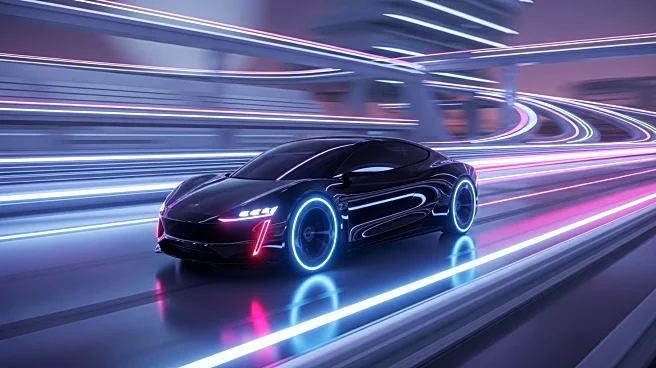What's Happening?
BYD has announced that its Yangwang U9 Xtreme version has set new records for production car top speed and EV lap time. The vehicle reached a top speed of 496.22 km/h (308.37 mph), surpassing its previous EV top speed record of 472.41 km/h. Additionally, it set an EV lap record at the Nürburgring with a time of 6:59.157. The car's performance was limited by the 500 km/h-rated tires, indicating potential for even higher speeds. The U9 Xtreme features a double-layer cooling structure, enhancing power by 133% and improving heat exchange efficiency by 40%. These advancements could be adapted to improve mainstream vehicle reliability and efficiency in extreme conditions.
Why It's Important?
The technological advancements demonstrated by BYD's Yangwang U9 Xtreme could significantly impact the electric vehicle industry. The improvements in cooling and power efficiency may lead to more reliable and efficient mainstream EVs, addressing common concerns about performance in extreme conditions. The record-setting speeds and lap times also enhance the appeal of EVs, potentially shifting consumer perceptions and increasing market demand. If these technologies are integrated into more accessible models, they could accelerate the transition to electric vehicles, benefiting both consumers and the environment.
What's Next?
BYD's achievements with the Yangwang U9 Xtreme may prompt further developments in EV technology, including faster charging solutions and enhanced energy recovery systems. The company might explore the integration of these advancements into its broader vehicle lineup, potentially influencing industry standards. As the technology trickles down to mainstream models, it could lead to increased competition among automakers to innovate and improve EV performance. Stakeholders, including consumers and environmental groups, will likely monitor these developments closely.
Beyond the Headlines
The success of the Yangwang U9 Xtreme highlights the potential for high-performance EVs to challenge traditional fossil-fueled hypercars, shifting the narrative around electric vehicles. This could lead to broader acceptance and enthusiasm for EVs, influencing cultural perceptions and driving policy changes to support sustainable transportation solutions.









